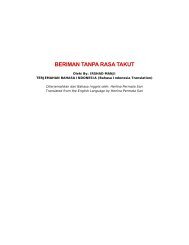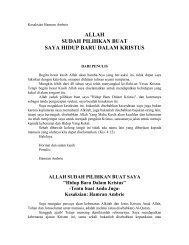A Critical Analysis of 'Real Islam'. Its People ... - Bukti dan Saksi
A Critical Analysis of 'Real Islam'. Its People ... - Bukti dan Saksi
A Critical Analysis of 'Real Islam'. Its People ... - Bukti dan Saksi
You also want an ePaper? Increase the reach of your titles
YUMPU automatically turns print PDFs into web optimized ePapers that Google loves.
scholars on the subject <strong>of</strong> dishonesty, Muslims hold true to form and in the spirit <strong>of</strong> what they know is<br />
allowed, will lie about lying. An example <strong>of</strong> Islamic deception is that Muslim activists always quote the<br />
passages <strong>of</strong> the Qur’an from the early part <strong>of</strong> Mohammed's ministry while living in Mecca. These texts<br />
are peaceful and exemplify tolerance towards those that are not followers <strong>of</strong> Islam. All the while, they are<br />
fully aware that most <strong>of</strong> these passages were abrogated (cancelled and replaced) by passages that came<br />
after he migrated to Medina. Another example is in the conduct <strong>of</strong> Saudi Arabia in the war on terror.<br />
Words <strong>of</strong> support and promises <strong>of</strong> reform flow easily to Americans, but actions to date demonstrate they<br />
are only words, meant for our consumption only.<br />
Unfortunately, passages from the Qur’an clearly reveal that lying is permitted, particularly in<br />
reference to non-believers in conflict with Muslims. It is also clear that if forced to do so, Muslims may<br />
lie under oath and can even falsely deny faith in Allah, as long as they maintain the pr<strong>of</strong>ession <strong>of</strong> faith in<br />
their hearts. In the Qur’an, Allah says: "Allah will not call you to account for thoughtlessness (vain) in<br />
your oaths, but for the intention in your hearts; and He is Oft-forgiving, Most Forbearing." Surah 2:225.<br />
The principal also has support in the Qur’an 3:28 and 16:106.<br />
In the Hadith, Mohammed emphasizes the same concept. From "Ehiaa Oloum al-Din," by the famous<br />
Islamic scholar al-Ghazali, Vol. 3: PP.284-287:<br />
One <strong>of</strong> Mohammed's daughters, Umm Kalthoum, testified that she had never heard the Apostle <strong>of</strong> Allah<br />
condone lying, except in these three situations: 1) For reconciliation among people. 2) In war. 3) Amongst<br />
spouses, to keep peace in the family.<br />
One passage from the Hadith quotes Mohammed as saying: "The sons <strong>of</strong> Adam are accountable for<br />
all lies except those uttered to help bring reconciliation between Muslims." The following quote<br />
demonstrates the broadness <strong>of</strong> situations in which the prophet permitted lying. "The sons <strong>of</strong> Adam are<br />
accountable for all lies with these exceptions: During war because war is deception, to reconcile among<br />
two quarreling men, and for a man to appease his wife." Considering that Islam has been in a perpetual<br />
state <strong>of</strong> war with non-believers, it appears there is neither accountability nor any practical limitation to<br />
deceiving non-Muslims.<br />
The Arabic word, "Takeyya", means "to prevent," or guard against. The principle <strong>of</strong> Al-taqiyya (also<br />
called taqiah, Al-takeyya, Al-taqiyah, or kitman) conveys the understanding that Muslims are permitted to<br />
lie as a preventive measure against anticipated harm to one's self or fellow Muslims. This principle gives<br />
Muslims the liberty to lie under circumstances that they perceive as life threatening. They can even deny<br />
the faith, if they do not mean it in their hearts. Al-taqiyya is based on the following Quranic verse:<br />
"Let not the believers Take for friends or helpers Unbelievers rather than believers: if any do that, in nothing<br />
will there be help from Allah: except by way <strong>of</strong> precaution (prevention), that ye may Guard yourselves from<br />
them (prevent them from harming you.) But Allah cautions you (To remember) Himself; for the final goal is to<br />
Allah." Surah 3: 28<br />
According to this verse a Muslim can pretend to befriend infidels (in violation <strong>of</strong> the teachings <strong>of</strong><br />
Islam) and even display false adherence with their unbelief to prevent them from harming Muslims.<br />
Under this concept <strong>of</strong> Taqiyya, if under the threat <strong>of</strong> force, it is legitimate for Muslims to act contrary to<br />
their faith. The devout are taught that in such circumstances the following actions are acceptable:<br />
Drinking wine and alcoholic beverages, abandoning prayers, skipping fasting during Rama<strong>dan</strong>,<br />
renouncing belief in Allah and Muhammad, kneeling in homage to a deity other than Allah, and uttering<br />
insincere oaths and covenants.<br />
Al-taqiyya and dissimulation refer to the practice <strong>of</strong> Muslims blatantly lying to non-Muslims, but the<br />
principal goes beyond mere lying for propaganda purposes. In accor<strong>dan</strong>ce with this license to deceive,<br />
during time <strong>of</strong> weakness the Qur’an allows Muslims to have both a declared agenda and a secret agenda.<br />
The theological principle <strong>of</strong> Taqiyya means hiding one's true beliefs and intentions to confuse ones<br />
adversaries and enable mujahedeen to operate freely amongst enemies. The word comes from a root<br />
meaning "to guard against, to keep (oneself)". From the verb Ittaqu, it means linguistically to 'dodge the<br />
threat'. In this vein, a Muslim, if necessary, may eat pork, drink alcohol, and even verbally deny the<br />
Islamic faith, as long as it is with the tongue only, and he does not "mean it in his heart". A believer is<br />
taught he can make any statement as long as the 'heart is comfortable'. If the end result <strong>of</strong> the lie is





